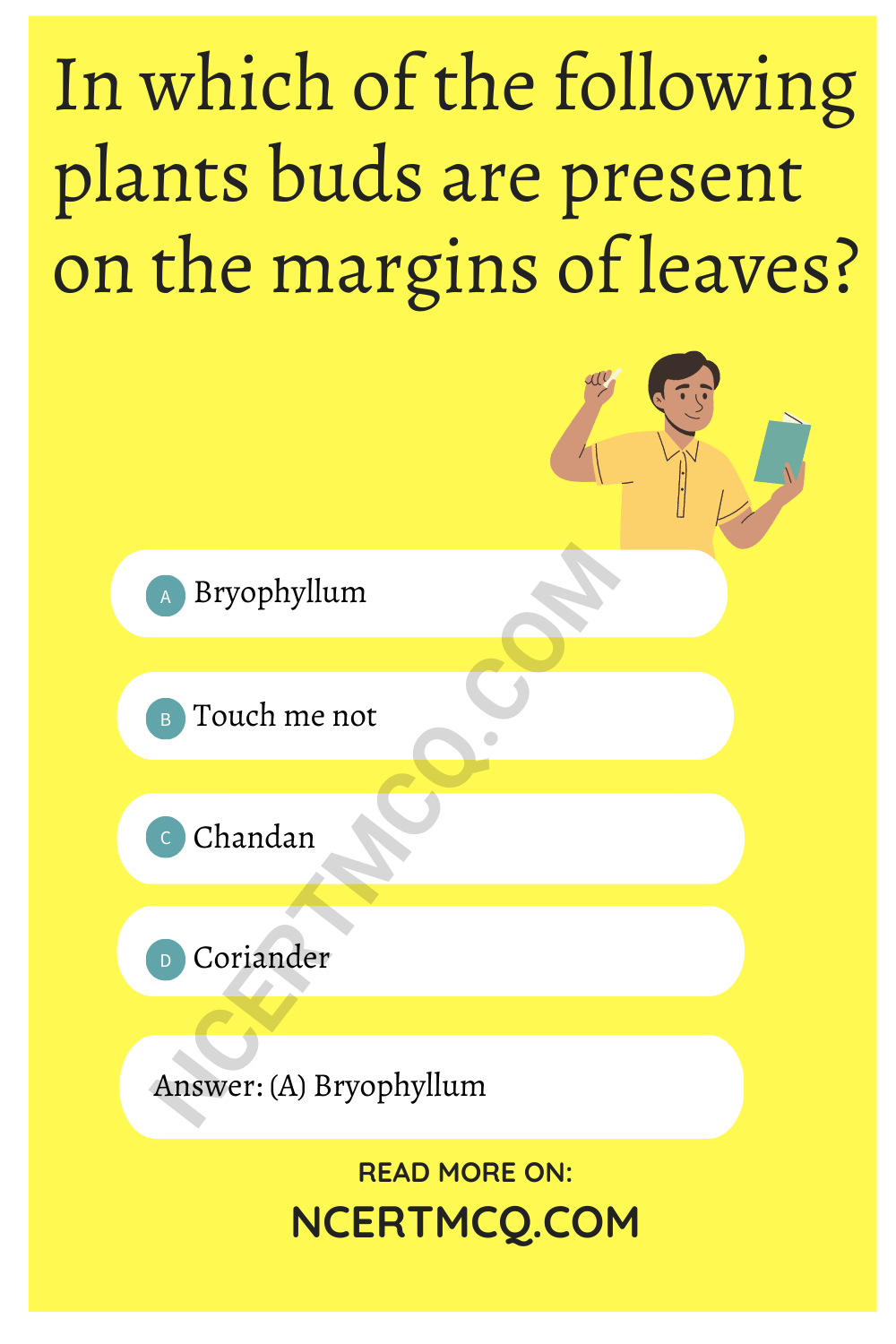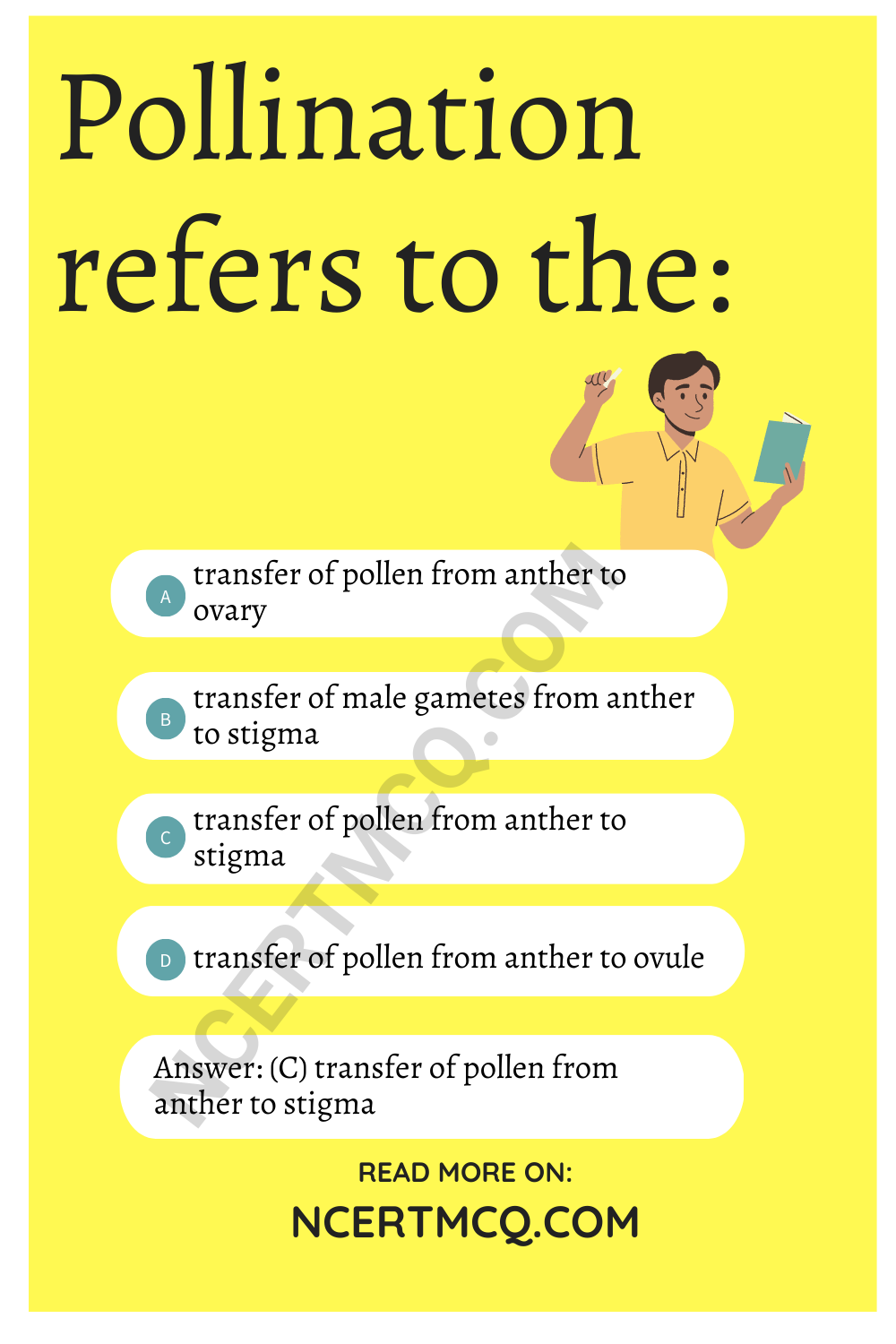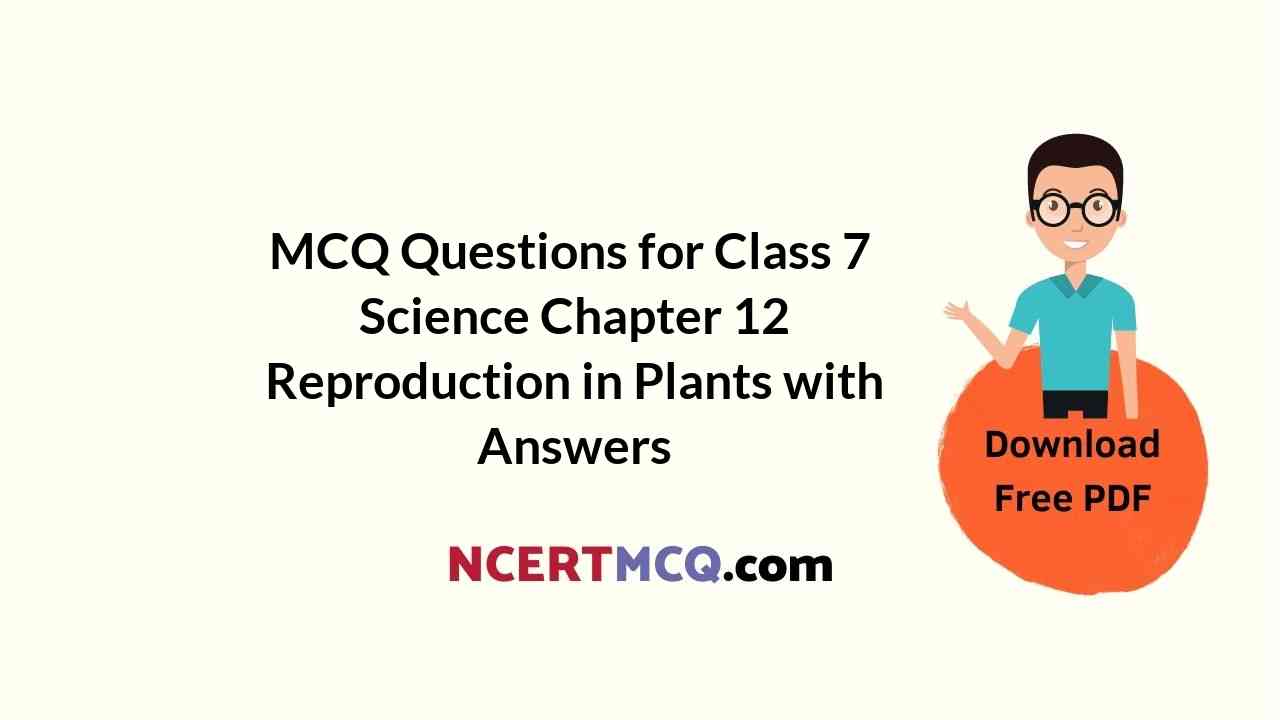Check the below Online Education NCERT MCQ Questions for Class 7 Science Chapter 12 Reproduction in Plants with Answers Pdf free download. MCQ Questions for Class 7 Science with Answers were prepared based on the latest exam pattern. We have Provided Reproduction in Plants Class 7 Science MCQs Questions with Answers to help students understand the concept very well. https://ncertmcq.com/mcq-questions-for-class-7-science-with-answers/
You can refer to NCERT Solutions for Class 7 Science Chapter 12 Reproduction in Plants to revise the concepts in the syllabus effectively and improve your chances of securing high marks in your board exams.
Class 7 Science Chapter 12 MCQ With Answers
Science Class 7 Chapter 12 MCQs On Reproduction in Plants
Choose the correct answer:
Reproduction In Plants Class 7 MCQ Question 1.
Vegetative propagation in potato takes place by
(a) leaves
(b) stem
(c) root
(d) seed
Answer
Answer: (b) stem
Class 7 Science Chapter 12 MCQ Question 2.
In which of the following plants buds are present on the margins of leaves?
(a) Bryophyllum
(b) Touch me not
(c) Chandan
(d) Coriander
Answer
Answer: (a) Bryophyllum

Reproduction In Plants Class 7 MCQ With Answers Question 3.
In yeasts reproduction occurs by
(a) fragmentation
(b) binary fission
(c) budding
(d) spore formation
Answer
Answer: (c) budding
MCQ Questions For Class 7 Science Chapter 12 Question 4.
Which of the following parts of a plant take part in sexual reproduction?
(i) Flower
(ii) Seed
(iii) Fruit
(iv) Branch
Choose the correct answer from below:
(a) (i) and (ii)
(b) (i), (ii) and (iii)
(c) (iii) and (iv)
(d) (ii), (iii) and (iv)
Answer
Answer: (b) (i), (ii) and (iii)
MCQ On Reproduction In Plants Class 7 Question 5.
Lila observed that a pond with clear water was covered up with a green algae within a week. By which method of reproduction did the algae spread so rapidly ?
(a) Budding
(b) Sexual reproduction
(c) Fragmentation
(d) Pollination
Answer
Answer: (c) Fragmentation
Class 7 Science Ch 12 MCQ Question 6.
Seeds of drumstick and maple are carried to long distances by wind because they possess
(a) winged seeds
(b) large and hairy seeds
(c) long and ridged fruits
(d) spiny seeds
Answer
Answer: (a) winged seeds
Reproduction In Plants MCQ Class 7 Question 7.
The ‘eye of the potato plant is what
(a) the root is to any plant
(b) the bud is to a flower
(c) the bud is to Bryophyllum leaf
(d) the anther is to stamen
Answer
Answer: (c) the bud is to Bryophyllum leaf
Class 7 Reproduction In Plants MCQ Question 8.
The ovaries of different flowers may contain
(a) only one ovule
(b) many ovules
(c) one to many ovules
(d) only two ovules
Answer
Answer: (c) one to many ovules
Class 7 Science Chapter 12 MCQ Online Test Question 9.
Which of the following statements is/are true for sexual reproduction in plants?
(i) Plants are obtained from seeds
(ii) Two plants are always essential
(iii) Fertilisation can occur only after pollination
(iv) Only insects are agents of pollination
Choose from the options given below:
(a) (i) and (ii)
(b) (i) only
(c) (i) and (ii)
(d) (i) and (iv)
Answer
Answer: (a) (i) and (ii)
Ch 12 Science Class 7 MCQ Question 10.
Pollination refers to the:
(a) transfer of pollen from anther to ovary
(b) transfer of male gametes from anther to stigma
(c) transfer of pollen from anther to stigma
(d) transfer of pollen from anther to ovule
Answer
Answer: (c) transfer of pollen from anther to stigma

Match the following:
| Column A | Column B |
| (i) Bread mould | (a) Cutting |
| (ii) Yeast | (b) Leaves |
| (iii) Potato | (c) Fragmentation |
| (iv) Bose | (d) Detached body part |
| (v) Sweet potato | (e) Spores |
| (vi) Bryophyllum | (f) Eye |
| (vii) Cactus | (g) Roots |
| (viii) Spirogyra | (h) Budding |
Answer
Answer:
| Column A | Column B |
| (i) Bread mould | (e) Spores |
| (ii) Yeast | (h) Budding |
| (iii) Potato | (f) Eye |
| (iv) Bose | (a) Cutting |
| (v) Sweet potato | (g) Roots |
| (vi) Bryophyllum | (b) Leaves |
| (vii) Cactus | (d) Detached body part |
| (viii) Spirogyra | (c) Fragmentation |
Fill in the blanks:
1. In …………………. reproduction, one individual can produce many individuals from its body parts.
Answer
Answer: asexual
2. Both stamen and carpel are present in …………………. flowers.
Answer
Answer: bisexual
3. Budding is a type of …………………. reproduction.
Answer
Answer: asexual
4. The process of …………………. ensures continuity of life on the earth.
Answer
Answer: reproduction
5. …………………. are the reproductive parts of a plant.
Answer
Answer: Flowers
6. Buds in potato are also called ………………….
Answer
Answer: eyes
7. Plants produce seeds as a result of …………………. reproduction.
Answer
Answer: sexual
8. The small bulb like projection coming out from the yeast cell is called a ………………….
Answer
Answer: bud
9. The …………………. develops into an embryo.
Answer
Answer: zygote
10. The fruits are ripened ………………….
Answer
Answer: ovary
Choose the true and false statements from the following:
1. Two individuals are needed for a sexual reproduction.
Answer
Answer: True
2. Seed is the only structure which develops into new plant.
Answer
Answer: False
3. Plants such as cacti produce new plants when their parts get detached from the main plant body.
Answer
Answer: True
4. Plants produced by vegetative propagation take less time to grow and bear flower and fruit.
Answer
Answer: True
5. The spores are asexual reproductive bodies.
Answer
Answer: True
6. Anther contains female gametes called eggs.
Answer
Answer: False
7. The fruit is ripened ovary.
Answer
Answer: True
8. Seed dispersal in coconut is aided by winds.
Answer
Answer: False
9. Fusion of male and female gametes is called pollination.
Answer
Answer: False
10. A bisexual flower has both male and female reproductive parts.
Answer
Answer: True
We hope the given NCERT MCQ Questions for Class 7 Science Chapter 12 Reproduction in Plants with Answers Pdf free download will help you. If you have any queries regarding Reproduction in Plants CBSE Class 7 Science MCQs Multiple Choice Questions with Answers, drop a comment below and we will get back to you soon.
Class 7 Science MCQ:
- Nutrition in Plants Class 7 MCQ
- Nutrition in Animals Class 7 MCQ
- Fibre to Fabric Class 7 MCQ
- Heat Class 7 MCQ
- Acids, Bases and Salts Class 7 MCQ
- Physical and Chemical Changes Class 7 MCQ
- Weather, Climate and Adaptations of Animals to Climate Class 7 MCQ
- Winds, Storms and Cyclones Class 7 MCQ
- Soil Class 7 MCQ
- Respiration in Organisms Class 7 MCQ
- Transportation in Animals and Plants Class 7 MCQ
- Reproduction in Plants Class 7 MCQ
- Motion and Time Class 7 MCQ
- Electric Current and Its Effects Class 7 MCQ
- Light Class 7 MCQ
- Water: A Precious Resource Class 7 MCQ
- Forests: Our Lifeline Class 7 MCQ
- Wastewater Story Class 7 MCQ
